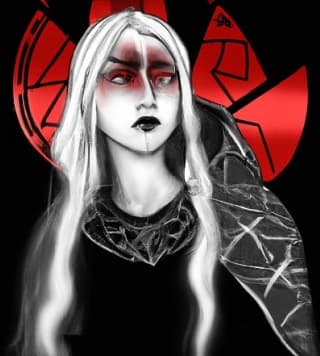Nanna - Goddess of Norse Mythology

A depiction of Nanna, grieving over the death of her husband.
Nanna (pronounced: "NAH-nuh") is a goddess in Norse mythology, belonging to the Æsir family. She is often associated with love and devotion. According to various sources, she is the daughter of Nep, Nepr, or Gevarus, and the wife of Baldr, with whom she had a son named Forseti.
The name "Nanna" in Old Norse runes is written as:
ᚾᛅᚾᚾᛅ
Her story is most well-known from the Icelandic lore of Snorri Sturluson.
In Snorri Sturluson's account, Nanna dies of grief following the death of her husband Baldr, and is placed on his funeral pyre. Hermóðr, a son of Odin, travels to the underworld to retrieve Baldr's soul, and he also receives gifts from Nanna to bring back to the living world. These gifts include a ring for Odin, a headscarf for Frigg, and a golden ring for Fulla.
In the Gesta Danorum, Nanna is portrayed as a Danish princess, daughter of Gevarus. She is courted by both Balderus and the Swedish king's son Hötherus, and chooses to marry Hötherus. Balderus challenges Hötherus to a fight, which leads to a war between gods and men. In the end, Hötherus kills Balderus, and Nanna and Hötherus have a son named Rorik Slyngebond, who becomes an ancestor of the Danish royal house.
Although few myths about Nanna have been preserved, she remains a significant figure in Norse mythology, representing both love and grief. Her story reflects the cycle of life, death, and rebirth that is central to Norse beliefs.
Please note that the information provided about Nanna and Norse mythology is complex and may be subject to interpretation and debate. The myths and stories of Norse mythology have evolved and been passed down through oral tradition and written accounts, and there may be variations in the way they are told and understood. This information should be used as a general reference and not as a definitive source on the subject.
If you notice an error on this web page, please email us at contact@historylists.org and let us know about it. Please be sure to include a brief description of the mistake you have noticed, along with the location of the mistake on the web page (e.g., the specific section or paragraph where it appears). We appreciate your help in keeping our website accurate and will use the information you provide to make necessary updates as soon as possible. Thank you for your assistance!
Other Norse Gods and Goddesses
- Baldr (Æsir) - God of Light, Beauty, and Goodness.
- Beyla (Ásynjur) - Goddess of Agriculture.
- Bil (Ásynjur) - Associated with the Moon.
- Borr (Æsir) - Father of the Norse Gods.
- Bragi (Æsir) - God of Poetry and Song.
- Byggvir (Vanir) - God of Agriculture.
- Dagr (Æsir) - God of Day.
- Dellingr (Æsir) - God of the Dawn.
- Eir (Ásynjur) - Goddess of Healing and Protector.
- Fjörgyn (Ásynjur) - Goddess of the Earth.
- Fjörgynn (Æsir) - God Associated with the Heavens.
- Forseti (Æsir) - God of Justice and Reconciliation.
- Freyja (Vanir) - God of Love, Fertility, War, and death.
- Freyr (Vanir) - God of Fertility and Prosperity.
- Frigg (Ásynjur) - Queen of the Gods.
- Fulla (Ásynjur) - Goddess of Fertility.
- Gefjon (Ásynjur) - Goddess of Fertility.
- Gerðr (Ásynjur) - Goddess of the Earth.
- Gersemi (Vanir) - Goddess of Precious Objects.
- Gná (Ásynjur) - Messenger of the Gods.
- Gullveig (Vanir) - Goddess of Witchcraft and Sorcery.
- Heimdall (Æsir) - Watchman of the Gods.
- Hel (Æsir) - Goddess of the Underworld.
- Hermóðr (Æsir) - Messenger of the Gods.
- Hjúki (Æsir) - Associated with the Moon.
- Hlín (Ásynjur) - Goddess of Protection.
- Hnoss (Vanir) - Goddess of Beauty and Treasure.
- Höðr (Æsir) - God of Darkness.
- Hœnir (Æsir) - God of Creation.
- Iðunn (Ásynjur) - Goddess of Immortality.
- Ilmr (Ásynjur) - Ancient and Little-Known Deity.
- Irpa (Ásynjur) - Ancient and Little-Known Deity.
- Ítreksjóð (Æsir) - Son of Odin.
- Jörð (Ásynjur) - Goddess of the Earth.
- Kvasir (Vanir) - God of Wisdom.
- Lóðurr (Æsir) - God of Creation.
- Lofn (Ásynjur) - Goddess of Love.
- Loki (Æsir) - God of Mischief and Deception.
- Magni (Æsir) - God of Strength.
- Máni (Æsir) - God of the Moon.
- Meili (Æsir) - God of Travel.
- Móði (Æsir) - God of Courage.
- Mimir (Æsir) - God of Wisdom.
- Nanna (Ásynjur) - Goddess of Love and Devotion.
- Njörðr (Vanir) - God of the Sea and Fertility.
- Njörun (Vanir) - Goddess of the Earth.
- Nótt (Æsir) - Goddess of the Night and Dreams.
- Odin (Æsir) - God of Creation and King of the Gods.
- Óðr (Vanir) - God of Divine Madness, Poetry, and Long Journeys.
- Rán (Ásynjur) - Goddess of the Sea and Death.
- Rindr (Ásynjur) - Goddess Associated with Vengeance.
- Sága (Ásynjur) - Goddess of Wisdom.
- Sif (Ásynjur) - Goddess of Abundance.
- Sigyn (Ásynjur) - Goddess of Loyalty.
- Sjöfn (Ásynjur) - Goddess of Love.
- Skaði (Ásynjur) - Goddess of Hunting, Skiing, and Winter.
- Snotra (Ásynjur) - Goddess of Wisdom.
- Sól (Ásynjur) - Goddess of the Sun.
- Syn (Ásynjur) - Goddess of Vigilance, Guardianship, and Defense.
- Þorgerðr Hölgabrúðr (Ásynjur) - Goddess Associated with Protection.
- Thor (Æsir) - God of Lightning and Protection.
- Þrúðr (Ásynjur) - Goddess of Might and Strength.
- Týr (Æsir) - God of War and Justice.
- Ullr (Æsir) - God of Skiing, Archery, and the Hunt.
- Váli (Æsir) - God of Revenge.
- Vár (Ásynjur) - Goddess of Oaths and Agreements.
- Vé (Æsir) - God of Creation.
- Víðarr (Æsir) - God of Vengeance.
- Vili (Æsir) - God of Creation.
- Vör (Ásynjur) - Goddess of Wisdom and Vigilance.